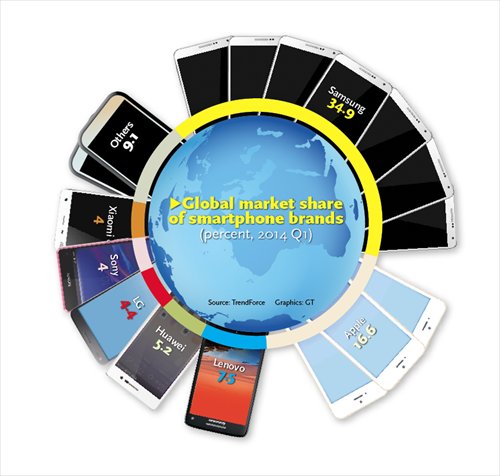 The 4th Chinese National Pole Dance Championship held in Tianjin
The 4th Chinese National Pole Dance Championship held in Tianjin
 Chinese navy commandos debut at 2014 RIMPAC
Chinese navy commandos debut at 2014 RIMPAC
 Guangxi impression: scenic countryside
Guangxi impression: scenic countryside
 World's largest aquatic insect found in Sichuan
World's largest aquatic insect found in Sichuan
 Ceremony volunteers for Youth Olympics make public appearance
Ceremony volunteers for Youth Olympics make public appearance
 A glimpse of female crew of Liaoning aircraft carrier
A glimpse of female crew of Liaoning aircraft carrier
 Stills from "Dad, where are we going?"
Stills from "Dad, where are we going?"
 Legless man's happy life
Legless man's happy life
 Top ten most beautiful islands in China
Top ten most beautiful islands in China
 Aerial view of Hong Kong
Aerial view of Hong Kong
 |
| (illustration:GT) |
In the first penalty of its kind, Xiaomi Taiwan, a unit of Beijing-based phone maker Xiaomi Inc, was slapped with a NT$600,000 ($20,002.74) fine for faking online sales of its budget phone in the Taiwanese market on Thursday.
The company's practice violated the local fair trade rules, Taiwan's Fair Trade Commission (FTC) said in an announcement on its website.
The budget phone, the Redmi, which was released by Xiaomi in July 2013 for mainland buyers, hit the Taiwanese market in December 2013.
For each of the three rounds of online sales of the phone in the Taiwanese market on December 9, December 16 and December 23, Xiaomi Taiwan claimed local participants had snapped up all the devices within minutes. However, investigations by the commission showed that the company's sellout claims were false.
Discrepancies between the actual figures and that claimed by the company stood at 661, 508 and 611 for each of the three rounds, totaling 1,780, according to the Global Times calculations based on the FTC announcement. That means Xiaomi had actually sold 26,220 units online, while it said it had sold out 28,000 units.
The company's reservation of a total of 1,750 phones for certain qualified buyers, which were not released for the online sales but was claimed by Xiaomi to be part of the sellout, had led to the discrepancy, according to the commission, adjudging the company misled customers with dubious claims constituting a violation of local fair trade rules.
The decision to impose the not-too-heavy NT$600,000 punishment took into account that the case was the first of its kind, and the fact that the firm's practices didn't restrict competition, a spokesman with the commission surnamed Wu, told the Global Times on Thursday.
The commission started the investigation soon after a local customer filed a report questioning irregularities in Xiaomi's online sales of the phone, said Wu, noting the commission was not targeting any company.
Xiaomi will receive the penalty notice in two days and need to pay the fine within 15 days, the spokesman told the Global Times on Thursday.
The company can appeal if it rejects the announcement, and its efforts to override the decision may require several months, he disclosed.
Xiaomi apologized for the discrepancy in a post on its official Weibo on Thursday, which said that its actual sales online plus the portion reserved for certain buyers came to 27,970 units, a gap of 30 with what had been announced, falling in line with the FTC's findings.
"The penalty won't have any impact on the company's business in Taiwan," Li Lei, a PR manager with Xiaomi, told the Global Times on Thursday, without revealing any further actions considered by the company, other than the Weibo post, in response to the FTC announcement.
The fine is unlikely to deal a blow to Xiaomi for the time being, but "if the company is labeled as insincere for exaggerated marketing, consumer confidence in its brand may sag so as to have an impact on its sales in the longer term," Bryan Wang, vice president and principal analyst at Forrester Research, told the Global Times on Thursday.
The commission will continue probes into similar practices, FTC's Wu also said and stressed heftier fines will be slapped for similar violations in the future.
Xiaomi is well-known for its employment of a "hunger marketing" strategy, in which it releases only a limited number of new models to generate interest and sales, that has successfully boosted its brand within a few years.
In the first quarter of 2014, Xiaomi, founded only in 2010, had a 4 percent share of the worldwide smartphone market in terms of shipments, ranking No.7, according to the latest data from Taiwan-based market research firm TrendForce.
Xiaomi's rapid rise to prominence epitomizes the advancement of mainland-based phone vendors in the global smartphone market in recent years while leading global brands face growing threats.
While Samsung and Apple continued to be the top two smartphone makers in the first quarter, according to TrendForce statistics, mainland-based handset manufacturers including Lenovo, Huawei and Xiaomi occupied six of the remaining eight positions in the top 10.
Although domestic brands such as Xiaomi are yet to genuinely outperform their global rivals in overseas markets, they already pose a substantial challenge especially for Samsung, which is going through tough times particularly in the mainland market, Wang at Forrester Research said.
The South Korean company on Thursday reported second-quarter operating profit of 7.19 trillion won ($7 billion), its poorest performance in two years. The drop was partly driven by slow global sales of smartphones and tablets, the company said in a statement.
 Blockbuster? No, it’s firefighters’ posters
Blockbuster? No, it’s firefighters’ posters
 Special 'gifts' for IT men for Chinese Qixi Festival
Special 'gifts' for IT men for Chinese Qixi Festival
 Foreign students' colorful life in China
Foreign students' colorful life in China
 French photographer‘s work 'China 2050' goes viral online
French photographer‘s work 'China 2050' goes viral online A bite of Halal Food
A bite of Halal Food
 Dressed in uniforms to marry you
Dressed in uniforms to marry you
 Female soldier in Chinese special force
Female soldier in Chinese special force
 Zhujiang ambassadors attend lotus lanterns activity
Zhujiang ambassadors attend lotus lanterns activity
 From girly girl to tough special police officer
From girly girl to tough special police officer
 22-year-old veteran travels around China
22-year-old veteran travels around China
 Night scenery of pagoda forests
Night scenery of pagoda forests China suffers from hot summer
China suffers from hot summer 48 hours after super Typhoon Rammasun
48 hours after super Typhoon Rammasun German pianist plays mid-air ‘magic carpet’ show over Munich Airport
German pianist plays mid-air ‘magic carpet’ show over Munich Airport
 China's manned deep-sea submersible conducts dive in Pacific Ocean
China's manned deep-sea submersible conducts dive in Pacific Ocean
Day|Week|Month